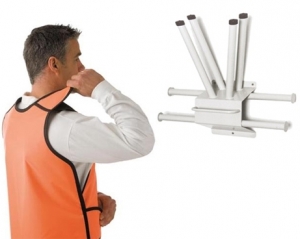Proper X-Ray Apron Care
Whether you already have an x-ray apron or you’re planning on purchasing one, it’s important to know the basic care requirements for keeping your x-ray apron intact. Understanding the proper x-ray apron care can result in longer use.We’ve broken this post down into four simple recommendations to consider for how to care for your x-ray apron.
1. Cleaning
In a medical setting, it’s easy for protective apparel to get dirty. If your x-ray apron is dirty from blood or other bodily fluids, you should clean it as soon as possible. Using cold water and mild detergent, carefully wipe down your x-ray apron. Do not use bleach or any harsh chemicals, this can deteriorate and perhaps alter the effectiveness of protection. Do not autoclave, dry-clean or machine launder x-ray aprons.
2. Storage
Don’t fold, crease, drape, or sit down tightly on your x-ray aprons. We strongly recommend that our aprons are safely hung on a lead apron rack, hanger or equivalent storage unit. After storing your x-ray apron make sure to hook and loop any closure to avoid snagging or tearing of fabric. Storing aprons correctly can increase the life cycle of your x-ray aprons.3. Inspection
It’s recommended that lead aprons are to be checked fluoroscopically at least once a year to uphold standard performance. Checking x-ray aprons as often as possible is always best practice, the slightest crack can render the apron damaged.
4. Disposal
Each apron that contains lead must be properly disposed. You can do this by contacting a disposal service who can properly discard lead material. Hazardous-waste carriers and certain handling companies have pick-up or drop-off services for unwanted aprons. Alternatively, all non-lead aprons can be disposed of in the regular garbage disposal. There is no need to contact a disposal service for non-lead aprons.
These recommendations are key to caring for x-ray aprons. Take care of your x-ray aprons, if not the abuse can significantly shorten apron’s use. If you have any questions or comments regarding x-ray apron care, please let us know in the comment box below.
Understanding the key elements of x-ray aprons
If you are looking to purchase a new x-ray apron, it is important to understand the core material, coverage and style options of the aprons you’re comparing. Download your free white paper below to learn more about selecting the proper x-ray apron for your specific needs.


Can the gowns be hung at the furthest corner within a theatre if there is no other practical wall? Will they accumulate radiation?
Themba
I also was wondering how often they should be cleaned? We check ours annually and scrub them down at that time, or when visibly soiled. Is there a standard for how
often they should be cleaned?
Hi Angie,
That’s a great question and one that we are asked quite frequently. I wanted to provide you with some additional insight into the proper cleaning of lead aprons, so, I reached out to one of our guest blog contributors to find out more information.
I spoke with Justin McKay, Vice President of Radiological Care Services, this morning and he shared some helpful information for our readers.
RCS Case Study: //www.radcareservices.com/how-long-rcs-case-study.html
Please let us know if you have any additional questions Angie.
Thank you,
Kevin
Relevant conversation and thread here. As a surgeon with 23 years + experience, I can tell you that I have tried everything to clean lead over the years. Nurses have complained that they continue to develop ringworm from the lead. A few of the hospitals in which I operate have started doing quarterly cleanings with a place called Radiological Care Services. I was hesitant at first to try them, but have been impressed with the results. Apparently, these people clean, sanitize and test your x-ray lead for you? I still like to use wipes on my lead after cases, but am now having my lead cleaned quarterly also. Good thread.
Hello Dr. Sieber,
Thank you for your comment and insight. It’s great to have a fresh perspective to add to the conversation. I recently came across RCS while conducting additional research into the topic. It appears that they have identified a rather serious infection control issue and are now providing a beneficial service to medical professionals and facilities. Properly maintaining, storing, and testing x-ray aprons are all important aspects of following proper radiation safety best practices. Thank you for sharing your experience!
Does caviwipes work to clean and deodorized the inner lining of the lead apron. coz my lead apron smell to much due to sweating to much.
Hi Lyndon,
X-ray Aprons should be cleaned daily and deodorized by scrubbing with a soft bristle brush, using cold water and a mild detergent. Completely remove cleaning residue by thoroughly rinsing with clean, cold water.
Here are some x-ray apron cleaning tips you will want to follow:
Never use products that contain bleach
Do not soak or submerge x-ray apron in water
Do not machine launder, autoclave or dry-clean
Once cleaning is complete, if possible, hang the x-ray apron on the designated apron wall rack to air dry
CaviWipes are designed to clean, disinfect and decontaminate exterior, hard, non-porous surfaces.
I would recommend contacting your Infection Control Team at your facility to determine which method meets their standards.
Thanks for reading,
Kevin
Many of our docs are complaining their lead is beginning to have a sweaty smell. How do you propose to get rid of the smell?
Thanks,
Tara
Hi Tara,
Our manufacturer recommends the following for cleaning:
Apron Cleaning
Many aqueous-based stains, especially from body fluids, are easily removed by wiping with a cloth/sponge dampened with water containing a non-aggressive, non-bleach detergent (dish detergent, such as Palmolive, works well). A soft scrubbing brush may be needed for dried blood and stubborn aqueous stains (including barium contrast media) where these have gone into the weave/fibers of the fabric. Deodorizing agents, such as Febreze, are suitable to clean the inner fabric lining from perspiration and body odors, especially thyroid collars/shields.
Hope this helps! Let us know if you have any further questions.
Faye
IS there a standard for how often an x-ray apron should be cleaned? IS there a standard for the product that should be used? Is it different than spot cleaning for an immediate spill?
Thanks,
Weslee